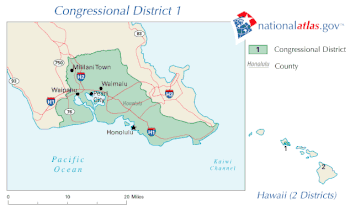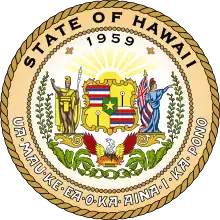| |||||||||||||||||||||
| |||||||||||||||||||||
 | |||||||||||||||||||||
| |||||||||||||||||||||
| Elections in Hawaii |
|---|
 |
The 2010 special election for the 1st congressional district of Hawaii was a special election to the United States House of Representatives that took place to fill the vacancy caused by Representative Neil Abercrombie's resignation on February 28, 2010 to focus on his campaign for Governor of Hawaii in the 2010 gubernatorial election.[1][2] Abercrombie planned not to run for re-election in 2010, and many of the candidates that were running for his open seat transferred to the special election.[1] The election was held on May 22, 2010 and Republican Charles Djou won, defeating five Democrats, four fellow Republicans, and four Independent candidates. The main reason for his win was because there were two Democratic candidates instead of one, which split the votes, allowing Djou to win, as Hawaii is an overwhelmingly Democratic state.[3][4] Djou became the first Republican elected to Congress from Hawaii since Pat Saiki in 1988; Djou volunteered on Saiki's 1988 campaign, and Saiki served as Djou's campaign chair in 2010. As of 2022, this was the last time in which a Republican was elected to Congress from Hawaii.
Special election rules
The election was held without a primary, meaning all candidates from all parties ran against one another and the person with the most votes (even if only a plurality) won; there was no runoff.[5] With three top-tier candidates running, two Democrats and one Republican, it was considered likely that the two Democrats would split the vote, leading to a Republican victory.[5]
This was conducted as a vote-by-mail election.[3] All registered voters as of the voter registration deadline were automatically mailed a packet containing the vote-by-mail ballot and return envelopes.[3] No polling places were open on May 22, 2010.[3] Ballots were mailed approximately 20 days prior to the election.[3] Voted ballots had to be received by the State of Hawaii Office of Elections no later than 6:00 p.m., May 22, 2010, in the return envelopes provided.[3]
Any voter requiring the use of an accessible voting machine could do so at the Office of the City Clerk, Honolulu Hale, 530 S. King St. from Monday, May 10, 2010 to Thursday, May 20, 2010, excluding Sundays and holidays between the hours of 8:00 a.m. to 4:00 p.m.[3] Walk-in voting was open on Saturdays during this period.[3]
Candidates
Democrats
- Vinny Browne
- Ed Case
- Del Castillo
- Colleen Hanabusa
- Philmund Lee
Republicans
- Charles Amsterdam
- Charles Collins
- Douglas Crum
- Charles Djou
- John Giuffre[1]
No party affiliation
- Jim Brewer
- Karl F. Moseley
- Kalaeloa Strode
- Steve Tataii
(list of candidates appearing on the May 22, 2010 State of Hawaii, U.S. Representative District 1 Special Vacancy Election ballot[6])
Campaign
Democratic leaders conceded that the winner-take-all primary favored the one lone Republican in the race. The Republican National Committee (RNC) indicated it might directly support Djou with the hope of winning a congressional seat in a historically Democratic state;[7] RNC political director Gentry Collins referred to Scott Brown's victory in a Massachusetts special election for the U.S. Senate in stating: "I think for us to win that seat will send a signal that what happened in Massachusetts is not an isolated event."[8]
Both Case and Hanabusa represented different wings of the party, Case being more of a blue-dog moderate Democrat, while Hanabusa was preferred by the liberal wing.[5] Hanabusa secured the endorsement of EMILY's List, the local party establishment, and local labor unions.[5][9] Case was at odds with the party establishment over his primary challenge to U.S. Senator Daniel Akaka in 2006 when he was still Representative of the 2nd district,[5] although Case claimed that any bad blood with the Democratic electorate over the primary challenge was gone, according to his internal polling.[10] Case also criticized Hanabusa for keeping her post as president of the State Senate while attempting to campaign, saying: "It is inconsistent for her to want to run the Senate in a time of crisis for our state and want to run a full-fledged congressional campaign."[11] The national Democratic Party establishment and the Obama administration signaled Case was their pick, believing him more electable than Hanabusa. Case received support from the Democratic Congressional Campaign Committee while Hanabusa said she hadn't spoken to them since the previous year.[9]
Both Case and Hanabusa proposed that the other drop out for the sake of party unity.[12] The Democratic Congressional Campaign Committee (DCCC) dispatched an aide to the state in the hopes of at least ensuring no other Democrats enter the race.[5] It was unlikely either Democrat would drop out; both represented different views and both already faced off in a 2002 special election for Hawaii's 2nd congressional district, which Case won.[5][13] The DCCC chairman Congressman Chris Van Hollen said he was counting on Abercrombie to help keep the seat Democratic, indicating that endorsements would be used to show which Democrat was preferred by the national party.[14] On May 10, 2010, the DCCC said it would not spend any further resources on the race, preferring to save those resources for the November election.[15]
Endorsements
- Tim Pawlenty, 38th Governor of Minnesota (2003-2011)[20]
- Mitt Romney, 70th Governor of Massachusetts (2003-2007), Republican candidate for President in 2008[21]
- Organizations
- U.S. Senators
- Daniel Akaka, U.S. Senator from Hawaii (1990-2013)[24]
- Daniel Inouye, U.S. Senator from Hawaii (1963-2012)[25]
- U.S. Representatives
- Madeleine Bordallo, U.S. Delegate from Guam's at-large congressional district (2003-2019)[26]
- Mike Honda, U.S. Representative from California's 15th congressional district (2001-2013)[27]
- Lynn Woolsey, U.S. Representative from California's 6th congressional district (1993-2013)[26]
- Organizations
- EMILY's List[28]
- Sierra Club Hawai'i[17]
Polling
| Poll source | Date(s) administered |
Sample size |
Margin of error |
Ed Case (D) |
Charles Djou (R) |
Colleen Hanabusa (D) |
Other | Undecided |
|---|---|---|---|---|---|---|---|---|
| Merriman River Group | May 6–7, 2010 | 1,081 | ±3.0 | 25.5% | 39.5% | 25.5% | — | 10% |
| Harstad Strategic Research | April 24–26, 2010 | 506 | n/a | 34% | 36% | 20% | — | — |
| Honolulu Advertiser | April 23–28, 2010 | 349 | ±5.2% | 28% | 36% | 22% | — | 13% |
| Daily Kos/Research 2000 | April 11–14, 2010 | 500 | ±4.5% | 29% | 32% | 28% | 4% | 7% |
| DCCC internal poll | April, 2010 | n/a | n/a | 32% | 32% | 27% | — | 9% |
| Honolulu Star-Bulletin/Mason-Dixon | January 8–12, 2010 | 403 | ±5% | 37% | 17% | 25% | — | 21% |
Results
| Party | Candidate | Votes | % | |
|---|---|---|---|---|
| Republican | Charles Djou | 67,610 | 39.4 | |
| Democratic | Colleen Hanabusa | 52,802 | 30.8 | |
| Democratic | Ed Case | 47,391 | 27.6 | |
| Total votes | 167,803 | 100.0 | ||
| Republican gain from Democratic | ||||
References
- 1 2 3 Borreca, Richard (December 11, 2009). "Abercrombie to resign from Congress to run for governor". Honolulu Star-Bulletin. Retrieved December 16, 2009.
- ↑ "Abercrombie resigns post". Honolulu Star-Bulletin. March 1, 2010. Retrieved March 12, 2010.
- 1 2 3 4 5 6 7 8 State of Hawaii Office of Elections (February 24, 2010). "FACTSHEET 2010 SPECIAL ELECTION U.S. House of Representatives, District 1" (PDF). Retrieved March 15, 2010.
- ↑ "Office of Elections" (PDF).
- 1 2 3 4 5 6 7 Kraushaar, Josh (December 21, 2009). "GOP sets sights on blue Hawaii". Politico. Retrieved March 12, 2010.
- ↑ "State Of Hawaii U.S. Representative District 1 Special Vacancy Election-May 22, 2010". Archived from the original on July 6, 2011. Retrieved April 26, 2010.
- ↑ Borreca, Richard (January 28, 2010). "Republicans envision coup with Djou". Honolulu Star-Bulletin. Retrieved March 12, 2010.
- ↑ DePledge, Derrick (January 28, 2010). "GOP sees opportunity in Islands". Honolulu Advertiser. Archived from the original on April 2, 2010. Retrieved March 12, 2010.
- 1 2 "Obama's Home Congressional District In Play". Huffingtonpost.com. April 24, 2010. Retrieved August 21, 2010.
- ↑ Miller, Sean J. (December 18, 2009). "Case: Dems forgave Akaka challenge". The Hill. Retrieved March 12, 2010.
- ↑ Borreca, Richard (January 14, 2010). "Case, Hanabusa spar over election". Honolulu Star-Bulletin. Retrieved March 12, 2010.
- ↑ Miller, Sean J. (December 26, 2009). "Lingering resentment could play into Hawaii congressional race". The Hill. Retrieved March 12, 2010.
- ↑ Gima, Craig (January 6, 2003). "Victorious Case sees end of old-style politics". Honolulu Star-Bulletin. Retrieved March 12, 2010.
- ↑ Soraghan, Mike; Blake, Aaron (December 11, 2009). "Both parties prepare for special election for Abercrombie seat". The Hill. Retrieved March 12, 2010.
- ↑ Zeleny, Jeff (May 10, 2010). "National Democrats Bow Out of Hawaii Race". The New York Times.
- ↑ "Ed Case". Ocean Champions. Archived from the original on September 26, 2010. Retrieved August 21, 2010.
- 1 2 "Sierra Club Hawaii Endorses Case, Hanabusa - Politics News Story - KITV Honolulu". Kitv.com. May 1, 2010. Archived from the original on February 23, 2012. Retrieved August 21, 2010.
- ↑ "Ed Case is the best choice for Congress". The Honolulu Advertiser. April 12, 2010. Archived from the original on April 21, 2010. Retrieved April 18, 2010.
- ↑ "Ed Case is best election choice". Honolulu Star Bulletin. May 6, 2010.
- ↑ Cillizza, Chris. "The Fix - Tim Pawlenty rolls out 2010 endorsements". Voices.washingtonpost.com. Retrieved August 21, 2010.
- ↑ Cillizza, Chris (April 12, 2010). "Romney wades into Hawaii special election, raises $1.5 million for PAC". The Washington Post. Retrieved April 13, 2010.
- ↑ "GOProud Endorses Charles Djou in Hawaii | Advocate.com". Archived from the original on July 16, 2012. Retrieved October 1, 2010.
- ↑ "GOProud endorses Djou for Congress". Archived from the original on September 2, 2010. Retrieved September 5, 2022.
- ↑ Keoki Kerr KITV4 News (April 5, 2010). "DCCC Will Not Rule Out Endorsement In Special - Politics News Story - KITV Honolulu". Kitv.com. Archived from the original on February 23, 2012. Retrieved August 21, 2010.
{{cite web}}: CS1 maint: numeric names: authors list (link) - ↑ "Inouye aide to assist Hanabusa - Alex Isenstadt". Politico.Com. Retrieved August 21, 2010.
- 1 2 http://www.mercedsunstar.com/2010/05/11/1418095/hanabusa-endorsed-by-california.html
- ↑ http://www.mercurynews.com/breaking-news/ci_15061395
- ↑ "Congressional, Presidential and Political News, Blogs, Member Profiles". CQ Politics. Archived from the original on February 24, 2009. Retrieved August 21, 2010.
External links
- Hawaii Office of Elections website
- Official results from Hawaii Office of Elections website Archived
Debates
- Hawaii 1st District House Special Election Debate, C-SPAN, May 7, 2010


